The Implementation of Robotics and AI in Healthcare: Pros and Cons
VerifiedAdded on 2023/01/06
|12
|2453
|51
Report
AI Summary
This report examines the integration of Artificial Intelligence (AI) and robotics within healthcare settings, exploring the potential benefits and drawbacks of such implementation. The report synthesizes information from various articles, discussing AI's capacity to enhance data analysis, improve diagnostic efficiency, and personalize treatment plans. It also acknowledges concerns regarding job displacement, data privacy, and the reduction of human interaction in patient care. The report further explores strategies for effective implementation, including the need for training in medical education and the development of national strategies. It concludes by emphasizing the importance of a balanced approach that leverages AI's capabilities while preserving the crucial elements of human empathy and ethical considerations within healthcare. The report highlights the impact of AI on medical education and the need for future physicians to be prepared for the changing landscape of healthcare delivery.

Should Robotics and
Artificial Intelligence
be Implemented in all
Health Care Setting
Artificial Intelligence
be Implemented in all
Health Care Setting
Paraphrase This Document
Need a fresh take? Get an instant paraphrase of this document with our AI Paraphraser
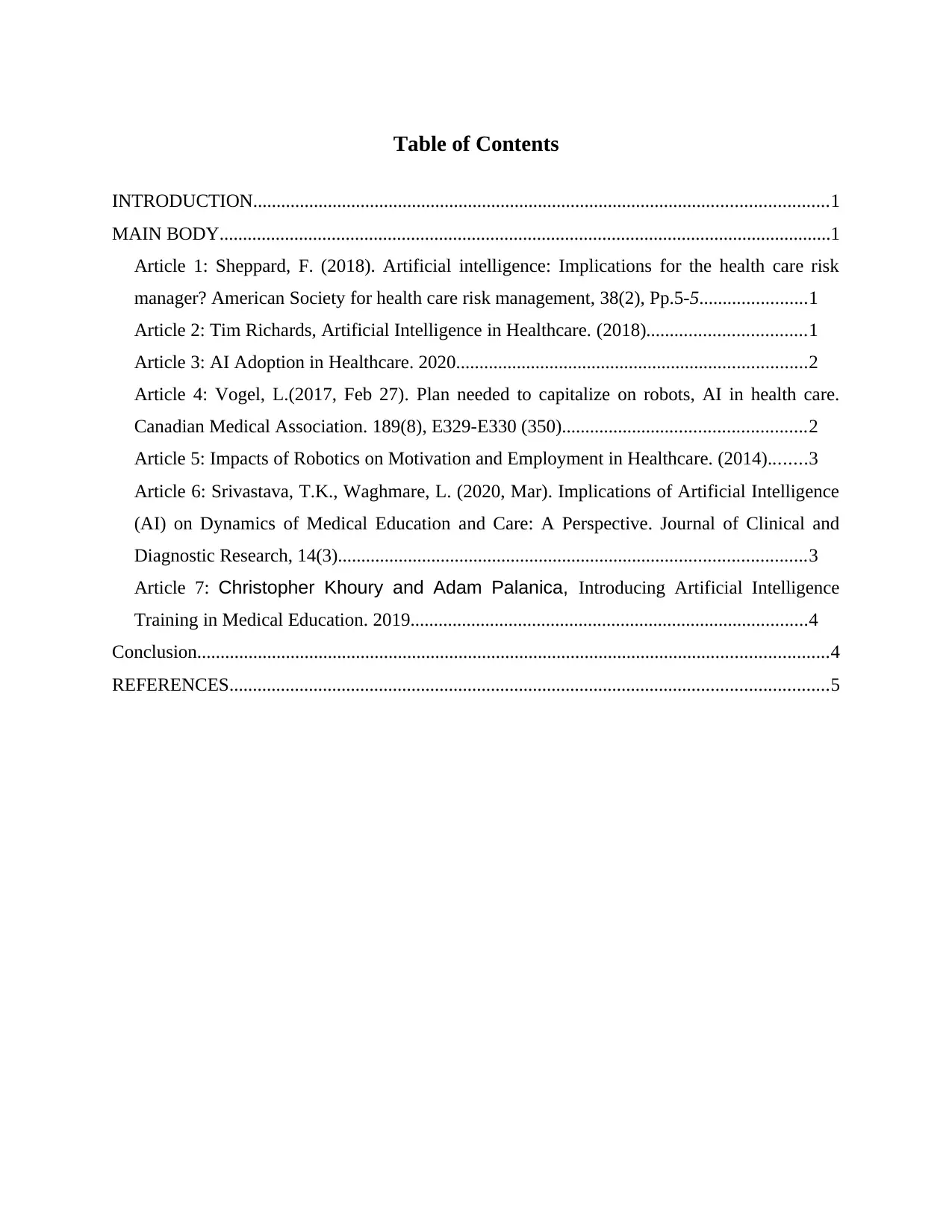
Table of Contents
INTRODUCTION...........................................................................................................................1
MAIN BODY...................................................................................................................................1
Article 1: Sheppard, F. (2018). Artificial intelligence: Implications for the health care risk
manager? American Society for health care risk management, 38(2), Pp.5-5.......................1
Article 2: Tim Richards, Artificial Intelligence in Healthcare. (2018)..................................1
Article 3: AI Adoption in Healthcare. 2020...........................................................................2
Article 4: Vogel, L.(2017, Feb 27). Plan needed to capitalize on robots, AI in health care.
Canadian Medical Association. 189(8), E329-E330 (350)....................................................2
Article 5: Impacts of Robotics on Motivation and Employment in Healthcare. (2014)........3
Article 6: Srivastava, T.K., Waghmare, L. (2020, Mar). Implications of Artificial Intelligence
(AI) on Dynamics of Medical Education and Care: A Perspective. Journal of Clinical and
Diagnostic Research, 14(3)....................................................................................................3
Article 7: Christopher Khoury and Adam Palanica, Introducing Artificial Intelligence
Training in Medical Education. 2019.....................................................................................4
Conclusion.......................................................................................................................................4
REFERENCES................................................................................................................................5
INTRODUCTION...........................................................................................................................1
MAIN BODY...................................................................................................................................1
Article 1: Sheppard, F. (2018). Artificial intelligence: Implications for the health care risk
manager? American Society for health care risk management, 38(2), Pp.5-5.......................1
Article 2: Tim Richards, Artificial Intelligence in Healthcare. (2018)..................................1
Article 3: AI Adoption in Healthcare. 2020...........................................................................2
Article 4: Vogel, L.(2017, Feb 27). Plan needed to capitalize on robots, AI in health care.
Canadian Medical Association. 189(8), E329-E330 (350)....................................................2
Article 5: Impacts of Robotics on Motivation and Employment in Healthcare. (2014)........3
Article 6: Srivastava, T.K., Waghmare, L. (2020, Mar). Implications of Artificial Intelligence
(AI) on Dynamics of Medical Education and Care: A Perspective. Journal of Clinical and
Diagnostic Research, 14(3)....................................................................................................3
Article 7: Christopher Khoury and Adam Palanica, Introducing Artificial Intelligence
Training in Medical Education. 2019.....................................................................................4
Conclusion.......................................................................................................................................4
REFERENCES................................................................................................................................5
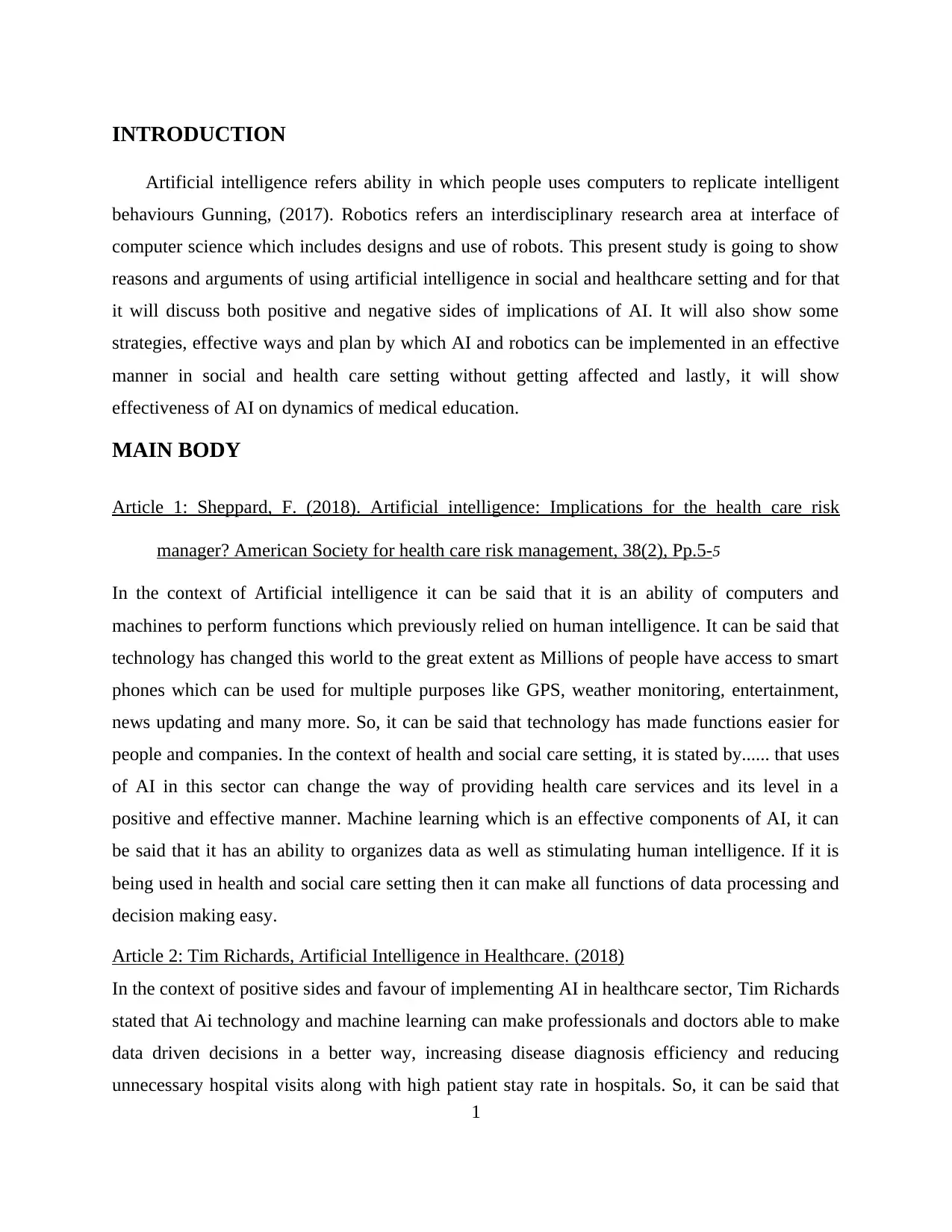
INTRODUCTION
Artificial intelligence refers ability in which people uses computers to replicate intelligent
behaviours Gunning, (2017). Robotics refers an interdisciplinary research area at interface of
computer science which includes designs and use of robots. This present study is going to show
reasons and arguments of using artificial intelligence in social and healthcare setting and for that
it will discuss both positive and negative sides of implications of AI. It will also show some
strategies, effective ways and plan by which AI and robotics can be implemented in an effective
manner in social and health care setting without getting affected and lastly, it will show
effectiveness of AI on dynamics of medical education.
MAIN BODY
Article 1: Sheppard, F. (2018). Artificial intelligence: Implications for the health care risk
manager? American Society for health care risk management, 38(2), Pp.5-5
In the context of Artificial intelligence it can be said that it is an ability of computers and
machines to perform functions which previously relied on human intelligence. It can be said that
technology has changed this world to the great extent as Millions of people have access to smart
phones which can be used for multiple purposes like GPS, weather monitoring, entertainment,
news updating and many more. So, it can be said that technology has made functions easier for
people and companies. In the context of health and social care setting, it is stated by...... that uses
of AI in this sector can change the way of providing health care services and its level in a
positive and effective manner. Machine learning which is an effective components of AI, it can
be said that it has an ability to organizes data as well as stimulating human intelligence. If it is
being used in health and social care setting then it can make all functions of data processing and
decision making easy.
Article 2: Tim Richards, Artificial Intelligence in Healthcare. (2018)
In the context of positive sides and favour of implementing AI in healthcare sector, Tim Richards
stated that Ai technology and machine learning can make professionals and doctors able to make
data driven decisions in a better way, increasing disease diagnosis efficiency and reducing
unnecessary hospital visits along with high patient stay rate in hospitals. So, it can be said that
1
Artificial intelligence refers ability in which people uses computers to replicate intelligent
behaviours Gunning, (2017). Robotics refers an interdisciplinary research area at interface of
computer science which includes designs and use of robots. This present study is going to show
reasons and arguments of using artificial intelligence in social and healthcare setting and for that
it will discuss both positive and negative sides of implications of AI. It will also show some
strategies, effective ways and plan by which AI and robotics can be implemented in an effective
manner in social and health care setting without getting affected and lastly, it will show
effectiveness of AI on dynamics of medical education.
MAIN BODY
Article 1: Sheppard, F. (2018). Artificial intelligence: Implications for the health care risk
manager? American Society for health care risk management, 38(2), Pp.5-5
In the context of Artificial intelligence it can be said that it is an ability of computers and
machines to perform functions which previously relied on human intelligence. It can be said that
technology has changed this world to the great extent as Millions of people have access to smart
phones which can be used for multiple purposes like GPS, weather monitoring, entertainment,
news updating and many more. So, it can be said that technology has made functions easier for
people and companies. In the context of health and social care setting, it is stated by...... that uses
of AI in this sector can change the way of providing health care services and its level in a
positive and effective manner. Machine learning which is an effective components of AI, it can
be said that it has an ability to organizes data as well as stimulating human intelligence. If it is
being used in health and social care setting then it can make all functions of data processing and
decision making easy.
Article 2: Tim Richards, Artificial Intelligence in Healthcare. (2018)
In the context of positive sides and favour of implementing AI in healthcare sector, Tim Richards
stated that Ai technology and machine learning can make professionals and doctors able to make
data driven decisions in a better way, increasing disease diagnosis efficiency and reducing
unnecessary hospital visits along with high patient stay rate in hospitals. So, it can be said that
1
⊘ This is a preview!⊘
Do you want full access?
Subscribe today to unlock all pages.

Trusted by 1+ million students worldwide
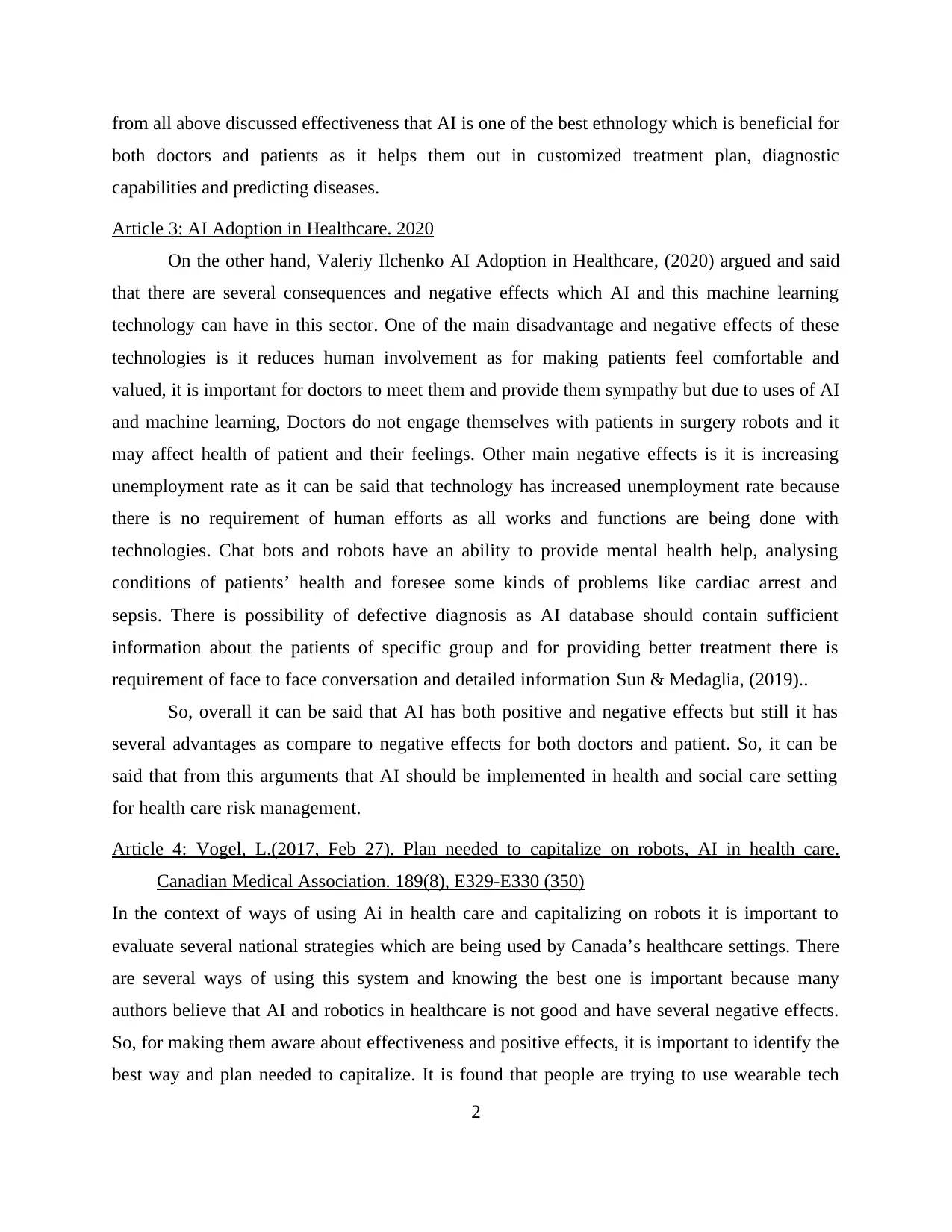
from all above discussed effectiveness that AI is one of the best ethnology which is beneficial for
both doctors and patients as it helps them out in customized treatment plan, diagnostic
capabilities and predicting diseases.
Article 3: AI Adoption in Healthcare. 2020
On the other hand, Valeriy Ilchenko AI Adoption in Healthcare, (2020) argued and said
that there are several consequences and negative effects which AI and this machine learning
technology can have in this sector. One of the main disadvantage and negative effects of these
technologies is it reduces human involvement as for making patients feel comfortable and
valued, it is important for doctors to meet them and provide them sympathy but due to uses of AI
and machine learning, Doctors do not engage themselves with patients in surgery robots and it
may affect health of patient and their feelings. Other main negative effects is it is increasing
unemployment rate as it can be said that technology has increased unemployment rate because
there is no requirement of human efforts as all works and functions are being done with
technologies. Chat bots and robots have an ability to provide mental health help, analysing
conditions of patients’ health and foresee some kinds of problems like cardiac arrest and
sepsis. There is possibility of defective diagnosis as AI database should contain sufficient
information about the patients of specific group and for providing better treatment there is
requirement of face to face conversation and detailed information Sun & Medaglia, (2019)..
So, overall it can be said that AI has both positive and negative effects but still it has
several advantages as compare to negative effects for both doctors and patient. So, it can be
said that from this arguments that AI should be implemented in health and social care setting
for health care risk management.
Article 4: Vogel, L.(2017, Feb 27). Plan needed to capitalize on robots, AI in health care.
Canadian Medical Association. 189(8), E329-E330 (350)
In the context of ways of using Ai in health care and capitalizing on robots it is important to
evaluate several national strategies which are being used by Canada’s healthcare settings. There
are several ways of using this system and knowing the best one is important because many
authors believe that AI and robotics in healthcare is not good and have several negative effects.
So, for making them aware about effectiveness and positive effects, it is important to identify the
best way and plan needed to capitalize. It is found that people are trying to use wearable tech
2
both doctors and patients as it helps them out in customized treatment plan, diagnostic
capabilities and predicting diseases.
Article 3: AI Adoption in Healthcare. 2020
On the other hand, Valeriy Ilchenko AI Adoption in Healthcare, (2020) argued and said
that there are several consequences and negative effects which AI and this machine learning
technology can have in this sector. One of the main disadvantage and negative effects of these
technologies is it reduces human involvement as for making patients feel comfortable and
valued, it is important for doctors to meet them and provide them sympathy but due to uses of AI
and machine learning, Doctors do not engage themselves with patients in surgery robots and it
may affect health of patient and their feelings. Other main negative effects is it is increasing
unemployment rate as it can be said that technology has increased unemployment rate because
there is no requirement of human efforts as all works and functions are being done with
technologies. Chat bots and robots have an ability to provide mental health help, analysing
conditions of patients’ health and foresee some kinds of problems like cardiac arrest and
sepsis. There is possibility of defective diagnosis as AI database should contain sufficient
information about the patients of specific group and for providing better treatment there is
requirement of face to face conversation and detailed information Sun & Medaglia, (2019)..
So, overall it can be said that AI has both positive and negative effects but still it has
several advantages as compare to negative effects for both doctors and patient. So, it can be
said that from this arguments that AI should be implemented in health and social care setting
for health care risk management.
Article 4: Vogel, L.(2017, Feb 27). Plan needed to capitalize on robots, AI in health care.
Canadian Medical Association. 189(8), E329-E330 (350)
In the context of ways of using Ai in health care and capitalizing on robots it is important to
evaluate several national strategies which are being used by Canada’s healthcare settings. There
are several ways of using this system and knowing the best one is important because many
authors believe that AI and robotics in healthcare is not good and have several negative effects.
So, for making them aware about effectiveness and positive effects, it is important to identify the
best way and plan needed to capitalize. It is found that people are trying to use wearable tech
2
Paraphrase This Document
Need a fresh take? Get an instant paraphrase of this document with our AI Paraphraser
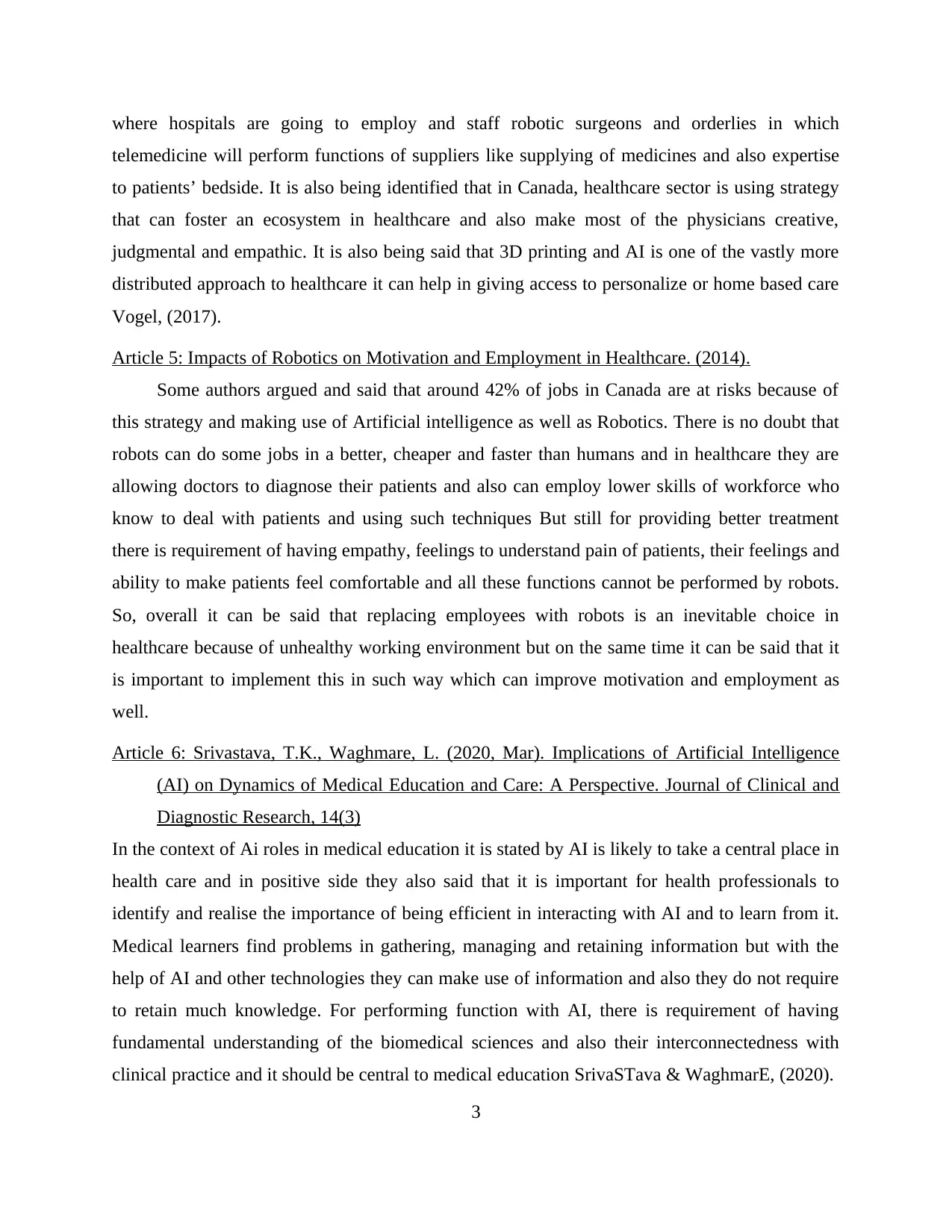
where hospitals are going to employ and staff robotic surgeons and orderlies in which
telemedicine will perform functions of suppliers like supplying of medicines and also expertise
to patients’ bedside. It is also being identified that in Canada, healthcare sector is using strategy
that can foster an ecosystem in healthcare and also make most of the physicians creative,
judgmental and empathic. It is also being said that 3D printing and AI is one of the vastly more
distributed approach to healthcare it can help in giving access to personalize or home based care
Vogel, (2017).
Article 5: Impacts of Robotics on Motivation and Employment in Healthcare. (2014).
Some authors argued and said that around 42% of jobs in Canada are at risks because of
this strategy and making use of Artificial intelligence as well as Robotics. There is no doubt that
robots can do some jobs in a better, cheaper and faster than humans and in healthcare they are
allowing doctors to diagnose their patients and also can employ lower skills of workforce who
know to deal with patients and using such techniques But still for providing better treatment
there is requirement of having empathy, feelings to understand pain of patients, their feelings and
ability to make patients feel comfortable and all these functions cannot be performed by robots.
So, overall it can be said that replacing employees with robots is an inevitable choice in
healthcare because of unhealthy working environment but on the same time it can be said that it
is important to implement this in such way which can improve motivation and employment as
well.
Article 6: Srivastava, T.K., Waghmare, L. (2020, Mar). Implications of Artificial Intelligence
(AI) on Dynamics of Medical Education and Care: A Perspective. Journal of Clinical and
Diagnostic Research, 14(3)
In the context of Ai roles in medical education it is stated by AI is likely to take a central place in
health care and in positive side they also said that it is important for health professionals to
identify and realise the importance of being efficient in interacting with AI and to learn from it.
Medical learners find problems in gathering, managing and retaining information but with the
help of AI and other technologies they can make use of information and also they do not require
to retain much knowledge. For performing function with AI, there is requirement of having
fundamental understanding of the biomedical sciences and also their interconnectedness with
clinical practice and it should be central to medical education SrivaSTava & WaghmarE, (2020).
3
telemedicine will perform functions of suppliers like supplying of medicines and also expertise
to patients’ bedside. It is also being identified that in Canada, healthcare sector is using strategy
that can foster an ecosystem in healthcare and also make most of the physicians creative,
judgmental and empathic. It is also being said that 3D printing and AI is one of the vastly more
distributed approach to healthcare it can help in giving access to personalize or home based care
Vogel, (2017).
Article 5: Impacts of Robotics on Motivation and Employment in Healthcare. (2014).
Some authors argued and said that around 42% of jobs in Canada are at risks because of
this strategy and making use of Artificial intelligence as well as Robotics. There is no doubt that
robots can do some jobs in a better, cheaper and faster than humans and in healthcare they are
allowing doctors to diagnose their patients and also can employ lower skills of workforce who
know to deal with patients and using such techniques But still for providing better treatment
there is requirement of having empathy, feelings to understand pain of patients, their feelings and
ability to make patients feel comfortable and all these functions cannot be performed by robots.
So, overall it can be said that replacing employees with robots is an inevitable choice in
healthcare because of unhealthy working environment but on the same time it can be said that it
is important to implement this in such way which can improve motivation and employment as
well.
Article 6: Srivastava, T.K., Waghmare, L. (2020, Mar). Implications of Artificial Intelligence
(AI) on Dynamics of Medical Education and Care: A Perspective. Journal of Clinical and
Diagnostic Research, 14(3)
In the context of Ai roles in medical education it is stated by AI is likely to take a central place in
health care and in positive side they also said that it is important for health professionals to
identify and realise the importance of being efficient in interacting with AI and to learn from it.
Medical learners find problems in gathering, managing and retaining information but with the
help of AI and other technologies they can make use of information and also they do not require
to retain much knowledge. For performing function with AI, there is requirement of having
fundamental understanding of the biomedical sciences and also their interconnectedness with
clinical practice and it should be central to medical education SrivaSTava & WaghmarE, (2020).
3
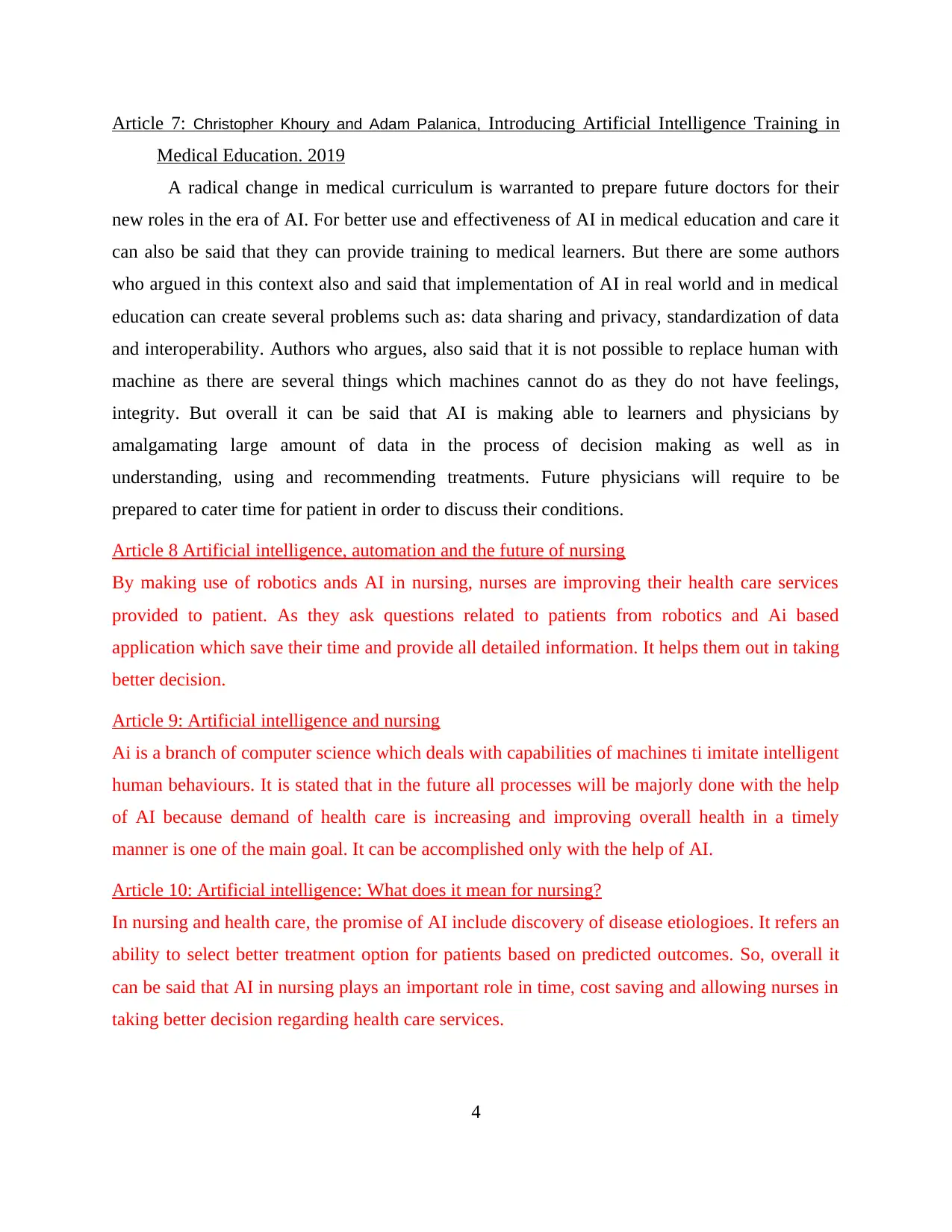
Article 7: Christopher Khoury and Adam Palanica, Introducing Artificial Intelligence Training in
Medical Education. 2019
A radical change in medical curriculum is warranted to prepare future doctors for their
new roles in the era of AI. For better use and effectiveness of AI in medical education and care it
can also be said that they can provide training to medical learners. But there are some authors
who argued in this context also and said that implementation of AI in real world and in medical
education can create several problems such as: data sharing and privacy, standardization of data
and interoperability. Authors who argues, also said that it is not possible to replace human with
machine as there are several things which machines cannot do as they do not have feelings,
integrity. But overall it can be said that AI is making able to learners and physicians by
amalgamating large amount of data in the process of decision making as well as in
understanding, using and recommending treatments. Future physicians will require to be
prepared to cater time for patient in order to discuss their conditions.
Article 8 Artificial intelligence, automation and the future of nursing
By making use of robotics ands AI in nursing, nurses are improving their health care services
provided to patient. As they ask questions related to patients from robotics and Ai based
application which save their time and provide all detailed information. It helps them out in taking
better decision.
Article 9: Artificial intelligence and nursing
Ai is a branch of computer science which deals with capabilities of machines ti imitate intelligent
human behaviours. It is stated that in the future all processes will be majorly done with the help
of AI because demand of health care is increasing and improving overall health in a timely
manner is one of the main goal. It can be accomplished only with the help of AI.
Article 10: Artificial intelligence: What does it mean for nursing?
In nursing and health care, the promise of AI include discovery of disease etiologioes. It refers an
ability to select better treatment option for patients based on predicted outcomes. So, overall it
can be said that AI in nursing plays an important role in time, cost saving and allowing nurses in
taking better decision regarding health care services.
4
Medical Education. 2019
A radical change in medical curriculum is warranted to prepare future doctors for their
new roles in the era of AI. For better use and effectiveness of AI in medical education and care it
can also be said that they can provide training to medical learners. But there are some authors
who argued in this context also and said that implementation of AI in real world and in medical
education can create several problems such as: data sharing and privacy, standardization of data
and interoperability. Authors who argues, also said that it is not possible to replace human with
machine as there are several things which machines cannot do as they do not have feelings,
integrity. But overall it can be said that AI is making able to learners and physicians by
amalgamating large amount of data in the process of decision making as well as in
understanding, using and recommending treatments. Future physicians will require to be
prepared to cater time for patient in order to discuss their conditions.
Article 8 Artificial intelligence, automation and the future of nursing
By making use of robotics ands AI in nursing, nurses are improving their health care services
provided to patient. As they ask questions related to patients from robotics and Ai based
application which save their time and provide all detailed information. It helps them out in taking
better decision.
Article 9: Artificial intelligence and nursing
Ai is a branch of computer science which deals with capabilities of machines ti imitate intelligent
human behaviours. It is stated that in the future all processes will be majorly done with the help
of AI because demand of health care is increasing and improving overall health in a timely
manner is one of the main goal. It can be accomplished only with the help of AI.
Article 10: Artificial intelligence: What does it mean for nursing?
In nursing and health care, the promise of AI include discovery of disease etiologioes. It refers an
ability to select better treatment option for patients based on predicted outcomes. So, overall it
can be said that AI in nursing plays an important role in time, cost saving and allowing nurses in
taking better decision regarding health care services.
4
⊘ This is a preview!⊘
Do you want full access?
Subscribe today to unlock all pages.

Trusted by 1+ million students worldwide
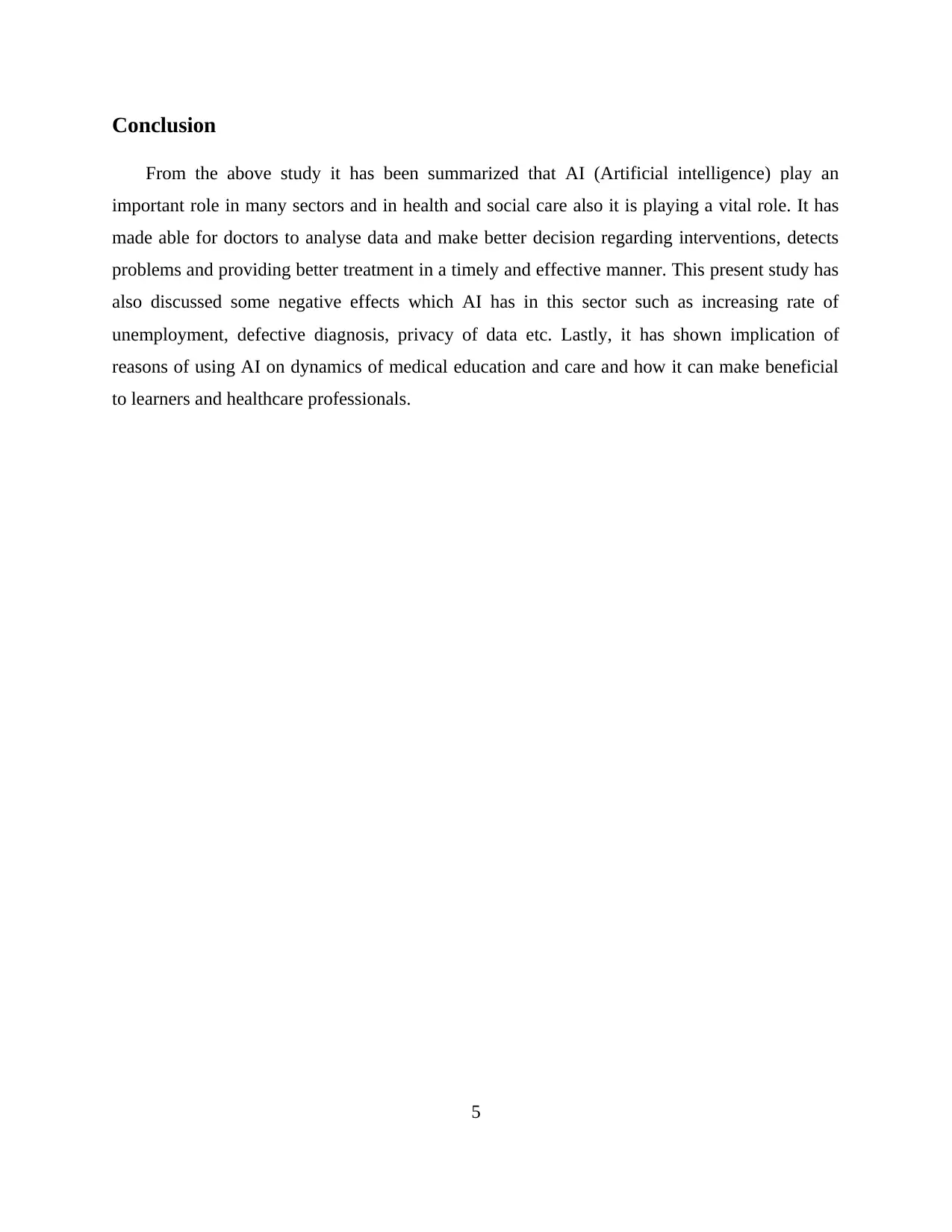
Conclusion
From the above study it has been summarized that AI (Artificial intelligence) play an
important role in many sectors and in health and social care also it is playing a vital role. It has
made able for doctors to analyse data and make better decision regarding interventions, detects
problems and providing better treatment in a timely and effective manner. This present study has
also discussed some negative effects which AI has in this sector such as increasing rate of
unemployment, defective diagnosis, privacy of data etc. Lastly, it has shown implication of
reasons of using AI on dynamics of medical education and care and how it can make beneficial
to learners and healthcare professionals.
5
From the above study it has been summarized that AI (Artificial intelligence) play an
important role in many sectors and in health and social care also it is playing a vital role. It has
made able for doctors to analyse data and make better decision regarding interventions, detects
problems and providing better treatment in a timely and effective manner. This present study has
also discussed some negative effects which AI has in this sector such as increasing rate of
unemployment, defective diagnosis, privacy of data etc. Lastly, it has shown implication of
reasons of using AI on dynamics of medical education and care and how it can make beneficial
to learners and healthcare professionals.
5
Paraphrase This Document
Need a fresh take? Get an instant paraphrase of this document with our AI Paraphraser
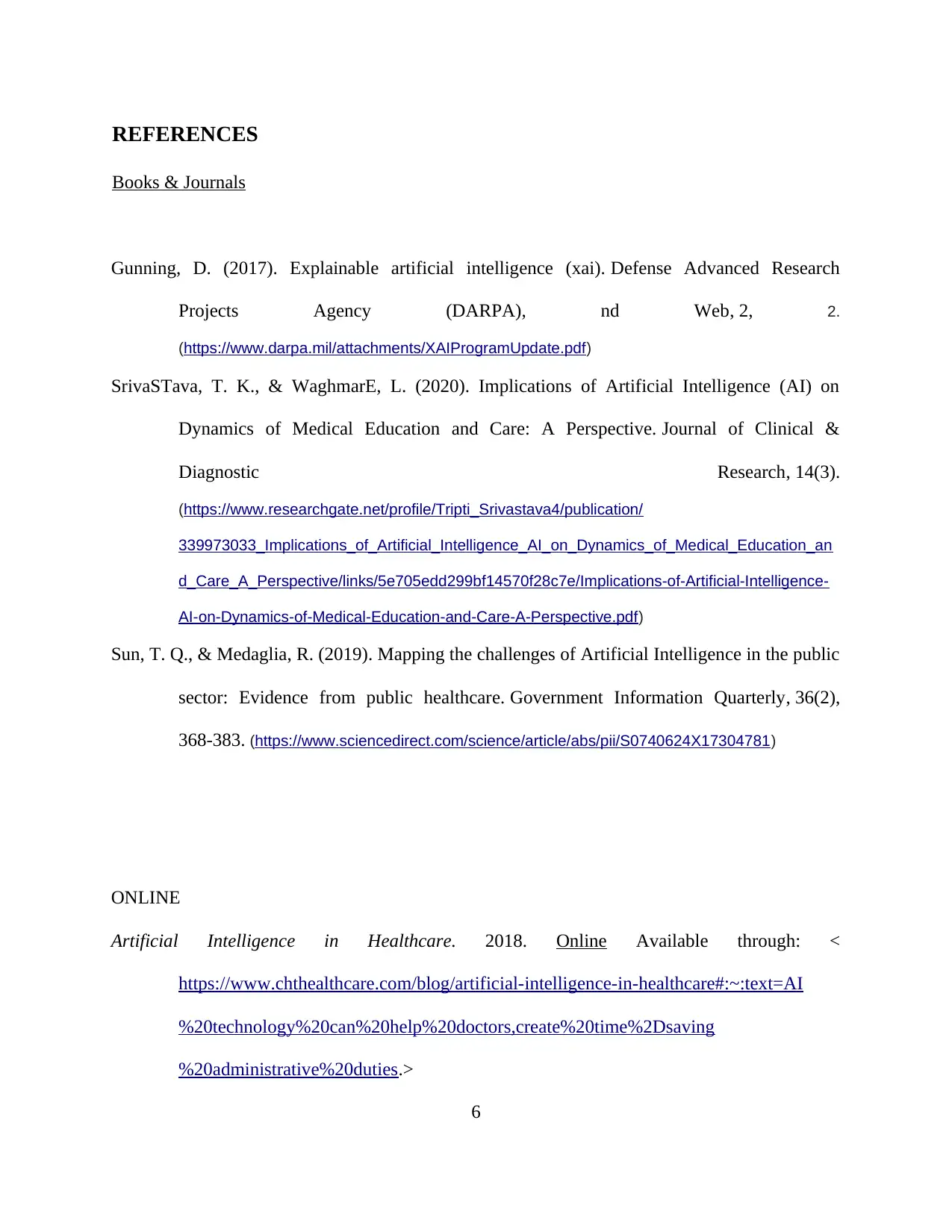
REFERENCES
Books & Journals
Gunning, D. (2017). Explainable artificial intelligence (xai). Defense Advanced Research
Projects Agency (DARPA), nd Web, 2, 2.
(https://www.darpa.mil/attachments/XAIProgramUpdate.pdf)
SrivaSTava, T. K., & WaghmarE, L. (2020). Implications of Artificial Intelligence (AI) on
Dynamics of Medical Education and Care: A Perspective. Journal of Clinical &
Diagnostic Research, 14(3).
(https://www.researchgate.net/profile/Tripti_Srivastava4/publication/
339973033_Implications_of_Artificial_Intelligence_AI_on_Dynamics_of_Medical_Education_an
d_Care_A_Perspective/links/5e705edd299bf14570f28c7e/Implications-of-Artificial-Intelligence-
AI-on-Dynamics-of-Medical-Education-and-Care-A-Perspective.pdf)
Sun, T. Q., & Medaglia, R. (2019). Mapping the challenges of Artificial Intelligence in the public
sector: Evidence from public healthcare. Government Information Quarterly, 36(2),
368-383. (https://www.sciencedirect.com/science/article/abs/pii/S0740624X17304781)
ONLINE
Artificial Intelligence in Healthcare. 2018. Online Available through: <
https://www.chthealthcare.com/blog/artificial-intelligence-in-healthcare#:~:text=AI
%20technology%20can%20help%20doctors,create%20time%2Dsaving
%20administrative%20duties.>
6
Books & Journals
Gunning, D. (2017). Explainable artificial intelligence (xai). Defense Advanced Research
Projects Agency (DARPA), nd Web, 2, 2.
(https://www.darpa.mil/attachments/XAIProgramUpdate.pdf)
SrivaSTava, T. K., & WaghmarE, L. (2020). Implications of Artificial Intelligence (AI) on
Dynamics of Medical Education and Care: A Perspective. Journal of Clinical &
Diagnostic Research, 14(3).
(https://www.researchgate.net/profile/Tripti_Srivastava4/publication/
339973033_Implications_of_Artificial_Intelligence_AI_on_Dynamics_of_Medical_Education_an
d_Care_A_Perspective/links/5e705edd299bf14570f28c7e/Implications-of-Artificial-Intelligence-
AI-on-Dynamics-of-Medical-Education-and-Care-A-Perspective.pdf)
Sun, T. Q., & Medaglia, R. (2019). Mapping the challenges of Artificial Intelligence in the public
sector: Evidence from public healthcare. Government Information Quarterly, 36(2),
368-383. (https://www.sciencedirect.com/science/article/abs/pii/S0740624X17304781)
ONLINE
Artificial Intelligence in Healthcare. 2018. Online Available through: <
https://www.chthealthcare.com/blog/artificial-intelligence-in-healthcare#:~:text=AI
%20technology%20can%20help%20doctors,create%20time%2Dsaving
%20administrative%20duties.>
6
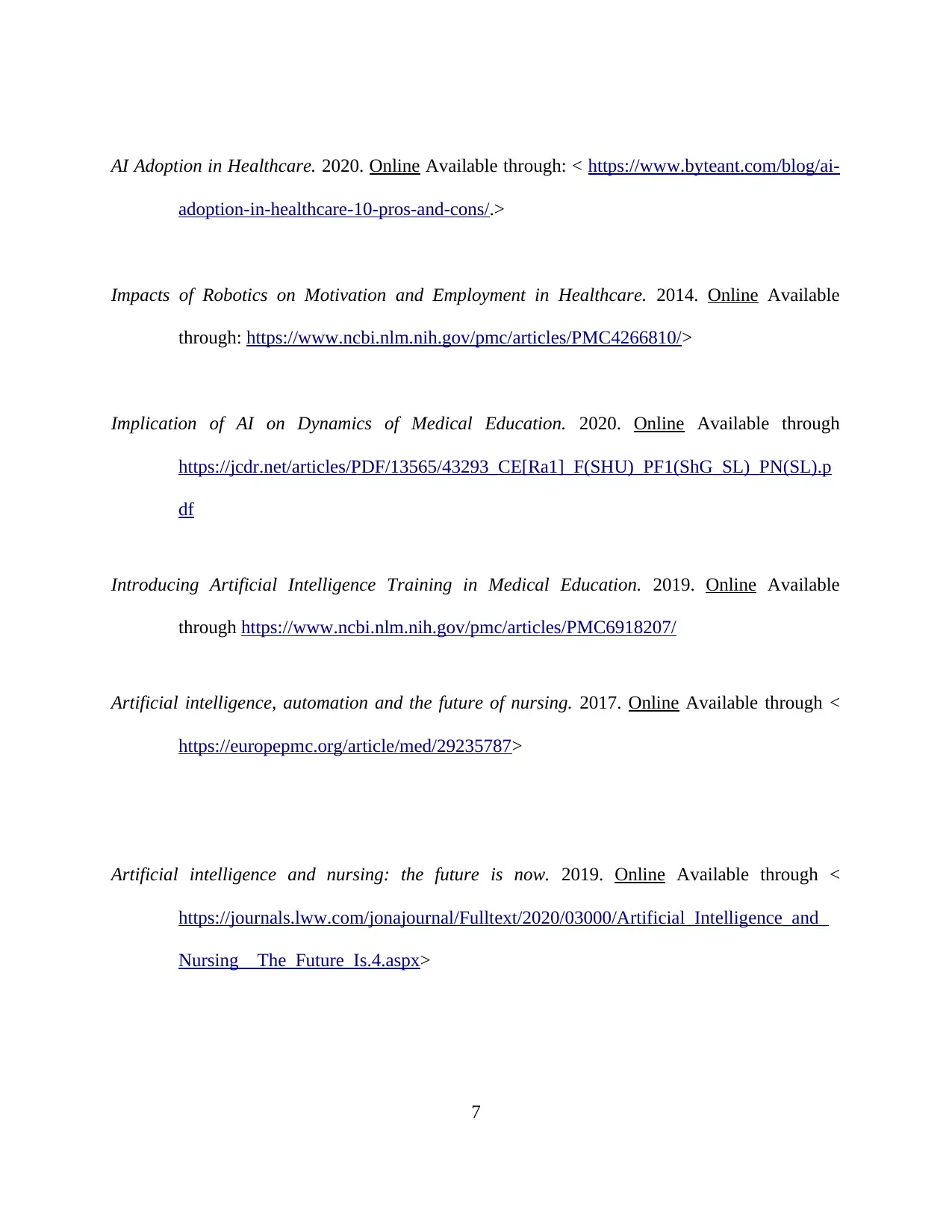
AI Adoption in Healthcare. 2020. Online Available through: < https://www.byteant.com/blog/ai-
adoption-in-healthcare-10-pros-and-cons/.>
Impacts of Robotics on Motivation and Employment in Healthcare. 2014. Online Available
through: https://www.ncbi.nlm.nih.gov/pmc/articles/PMC4266810/>
Implication of AI on Dynamics of Medical Education. 2020. Online Available through
https://jcdr.net/articles/PDF/13565/43293_CE[Ra1]_F(SHU)_PF1(ShG_SL)_PN(SL).p
df
Introducing Artificial Intelligence Training in Medical Education. 2019. Online Available
through https://www.ncbi.nlm.nih.gov/pmc/articles/PMC6918207/
Artificial intelligence, automation and the future of nursing. 2017. Online Available through <
https://europepmc.org/article/med/29235787>
Artificial intelligence and nursing: the future is now. 2019. Online Available through <
https://journals.lww.com/jonajournal/Fulltext/2020/03000/Artificial_Intelligence_and_
Nursing__The_Future_Is.4.aspx>
7
adoption-in-healthcare-10-pros-and-cons/.>
Impacts of Robotics on Motivation and Employment in Healthcare. 2014. Online Available
through: https://www.ncbi.nlm.nih.gov/pmc/articles/PMC4266810/>
Implication of AI on Dynamics of Medical Education. 2020. Online Available through
https://jcdr.net/articles/PDF/13565/43293_CE[Ra1]_F(SHU)_PF1(ShG_SL)_PN(SL).p
df
Introducing Artificial Intelligence Training in Medical Education. 2019. Online Available
through https://www.ncbi.nlm.nih.gov/pmc/articles/PMC6918207/
Artificial intelligence, automation and the future of nursing. 2017. Online Available through <
https://europepmc.org/article/med/29235787>
Artificial intelligence and nursing: the future is now. 2019. Online Available through <
https://journals.lww.com/jonajournal/Fulltext/2020/03000/Artificial_Intelligence_and_
Nursing__The_Future_Is.4.aspx>
7
⊘ This is a preview!⊘
Do you want full access?
Subscribe today to unlock all pages.

Trusted by 1+ million students worldwide

Artificial intelligence: What does it mean for nursing? 2019. Online Available through
<https://journals.lww.com/neponline/Citation/2019/07000/Artificial_Intelligence__Wha
t_Does_It_Mean_for.21.aspx>
8
<https://journals.lww.com/neponline/Citation/2019/07000/Artificial_Intelligence__Wha
t_Does_It_Mean_for.21.aspx>
8
Paraphrase This Document
Need a fresh take? Get an instant paraphrase of this document with our AI Paraphraser

9

10
⊘ This is a preview!⊘
Do you want full access?
Subscribe today to unlock all pages.

Trusted by 1+ million students worldwide
1 out of 12
Related Documents
Your All-in-One AI-Powered Toolkit for Academic Success.
+13062052269
info@desklib.com
Available 24*7 on WhatsApp / Email
![[object Object]](/_next/static/media/star-bottom.7253800d.svg)
Unlock your academic potential
Copyright © 2020–2026 A2Z Services. All Rights Reserved. Developed and managed by ZUCOL.





